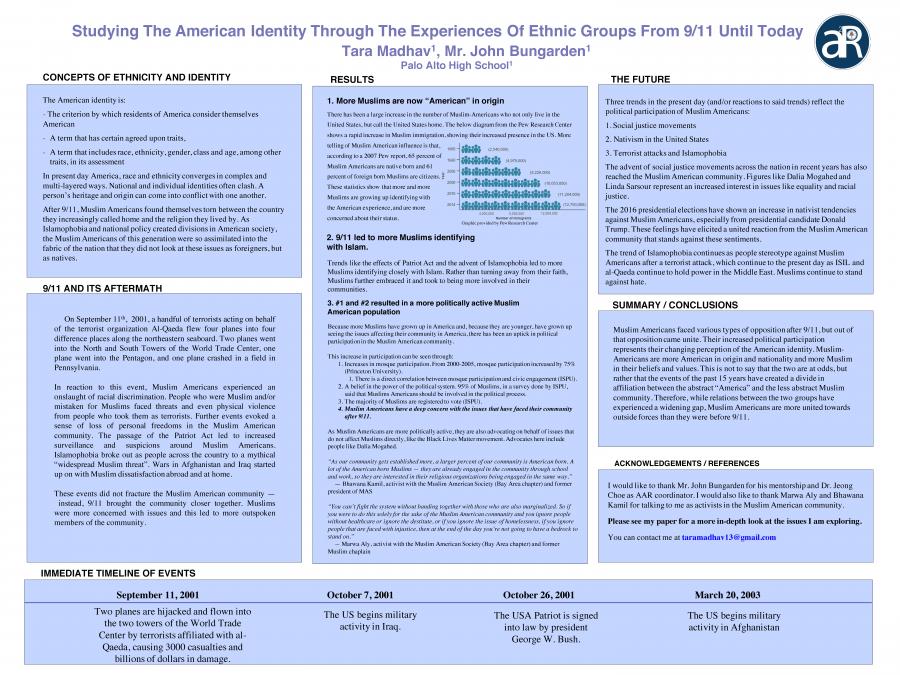Studying the American Identity through the Experiences of Ethnic Groups from 9/11 Until Today by Tara M.
Presentation
Summary
How have the ways ethnic groups defined themselves as Americans changed or stayed the same over the past 14-15 years since 9/11? To define oneself as American means to correlate oneself with the larger group of American identity. American identity resides not in concrete criterion or specific tasks on the way to full acceptance — like any other group in the world, a person must feel he or she belongs to actually belong. As Michael Jay Friedman says in an article for the US Bureau of International Information Programs, the American identity is centered around attitudes and actions versus ethnic, cultural and demographic identifications. While personal identity depends on personal criteria, national identity is much more concrete because of its larger acceptance and presence. American national identity can be defined as how the country as a whole defines themselves and how the government reflects the feelings, events and environment around them. American national identity and personal identity often clash with each other, and it is in this divergence that I will examine how the past 14 to 15 years have affected American residents’ view of themselves and their country. When I refer to identity, I do not mean a solid definition — I mean a changing concept of identification that can be apparently seen through public forums like the mass media and government action. For the purposes of this experiment, I will be focusing on personal American identity with different ethnic groups — however, the national American identity merited mention...American identity intersects in complex and multifaceted ways with ethnic and racial identities. In the the essay collection Doing Race, edited by Paul M. L. Moya and Hazel Rose Markus, Moya and Markus discuss how the American sense of individualism clashes in many senses with intrinsically community-based ethnic identities. America, as it has developed on tenets of independence and individual responsibility, has also been built on pockets of society that are self-insulated and find pride in their own separation from a central American sense of self. Today, American society exists as a collection of smaller groups, many of which might pride themselves on their ethnic identity versus their American. Intense debate has erupted over whether or not residents should exists in such states of singularity, and in exchange many ethnically-grounded people have argued against a forced national identity. This conflict has played out amidst divisive events of the past 14 to 15 years -- the rise of terrorism, fundamental political rhetoric and the catastrophe that started it all, 9/11...After 9/11, terror and shock turned a new page in American history — one where protection, safety and surveillance led to foreign wars and divisive debates on security. As America became more vigilant, some of the fundamental elements of the American identity as a whole, our values and beliefs, were broken into pieces and examined for their worth — Should immigration be encouraged regardless of risk or limited because of risk? Does complete acceptance of diversity make us less unified or morally stronger? Does our foreign policy act in our best interests? Are we a people that accepts those of all ethnicities along with the issues they bring with them?

